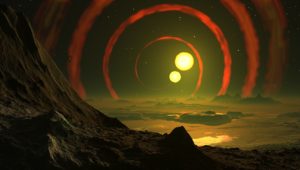
DasWortgewand / Pixabay
Since his crash landing on Calliope 4, which the native called Aurerallear, Thomas Alistair had seen many amazing thing. The flora upon the planet was wild and mobile, roaming the wide plains in slow movements like a stop-motion movie filmed day by day. In the sky were light shows unlike any on Earth and which he had not yet discovered a proper scientific explanation, and the double sunset every four or five days set a rhythm of beauty Thomas wished he could capture. Little of his equipment had survived the crash.
The natives, the Aurarauia (as far as he could pronounce), were a diverse people, with skin shades that ran from black to purple to blue to green to red, sometimes in one specimen. They were extremely social, always talking in their strange, soft language that was like wind whistling through various passages. They had not yet reached space, but their technology seemed equivalent, in its way, with early 20th century Earth, a sometimes incongruous mixture of natural methods and alien machine.
Thomas had adapted to their lifestyle as well as he could over the last nine months, but there were many aspects of their culture and religion he still did not understand. For instance, clans and families would leave for days at a time, on journeys to…well, he didn’t quite know what or where.
The Aururuia who had adopted him into his family system worked hard to understand Thomas’ language. Uhrah, as Thomas called him, had shown himself quite adept at English, far more so than Thomas was in their language.
Yesterday, Uhrah had said, “It is time.” He had said no more, and by the wrinkling of his face, Thomas knew that Uhrah had some happy secret. Thomas had often met silence in the face of his questions and been led to some scene or piece of art that was to be his explanation—and often times it did, in fact, answer his question far better than the dance of words did.
That day, they started out, Uhrah with his whole clan, across the plains toward where Thomas knew the sea to be. Not only his clan, but those of the entire city seemed to leave that day, and when he looked across the grasslands, he could see other groups moving in the same direction from other settlements. By evening, they arrived at the summit of a long, sloping descent that opened into a wide valley. Beyond that, somewhere, was the ocean.
In the valley were massive figures, some ten stories tall, like giants out of a story. In the fading light Thomas could not make out what they were, but the scale of them, silent and towering, filled him with a sense of awe.
In the morning, they descended among the figures—but they were not creatures. They were sculptures of flowing lines and strange curves, made not of stone but of braided grass and vines and exquisitely carved wood. They shone in vibrant colors in the light of the double suns, rising almost simultaneously for only the second time Thomas could remember. Dozens of these gigantic works of art filled the valley, and Thomas walked among them, dazed by the scope and detail and sheer variety. Any museum of Earth would proudly display the meanest of these scupltures.
“Why?” Thomas asked Uhrah.
“It is done every year. To worship the god.”
“So many….”
“Clans have worked day and day. We are happy.”
“You should be.”
“This is us.” He gestured to a work that seemed like a flowering tree, a trunk with plants and animals and spiritual figures emerging, teeming with an explosive energy caught in a frozen moment.
Thomas spent the day wandering, trying to take it all in. He could dwell on a single one for a hour. They were scenes out of a hundred happy dreams, expressions of music in lyrical abstraction, mythic recreations of life and suffering and redemption.
Uhrah led him, against his will, away from the garden of gods, back to where they had camped the night before. Thousands of them waited along the slope, sitting and standing and laughing and chatting, facing the figures almost hidden in shadow.
Suddenly, a flame appeared, then another. The Aurarauia stood and pointed and the noise grew deafening.
“What’s happening?” Thomas asked.
“Fire,” Uhrah said. “Watch.”
Thomas could not turn away if he wanted. The flames licked the sculptures. One by one, each seemed to gain its own fire. And they burned. Smoke rose into the night sky and the valley glowed as bright as day beneath the growing, ever growing, insatiable flames. Pillars of fire rose, a temple of conflagration, the sculptures alight and falling away in great mounds of ash.
Thomas wiped his eyes, unable to stop crying. He had been happy, down there. Lost, alone, he had seen beauty.
“Why?” Thomas asked. “Why?”
“The God is beauty,” Uhrah replied soberly. “We make beauty. We give to the God.”
“Why does it have to be burned? Can’t you keep it? Save it?”
Uhrah did not answer at first. “Beauty is not ending. Cannot end. The God is beauty. Beauty is day and day.”
Thomas sat, exhausted, and watched until only coals remained, like the light of Earth cities seen from space.